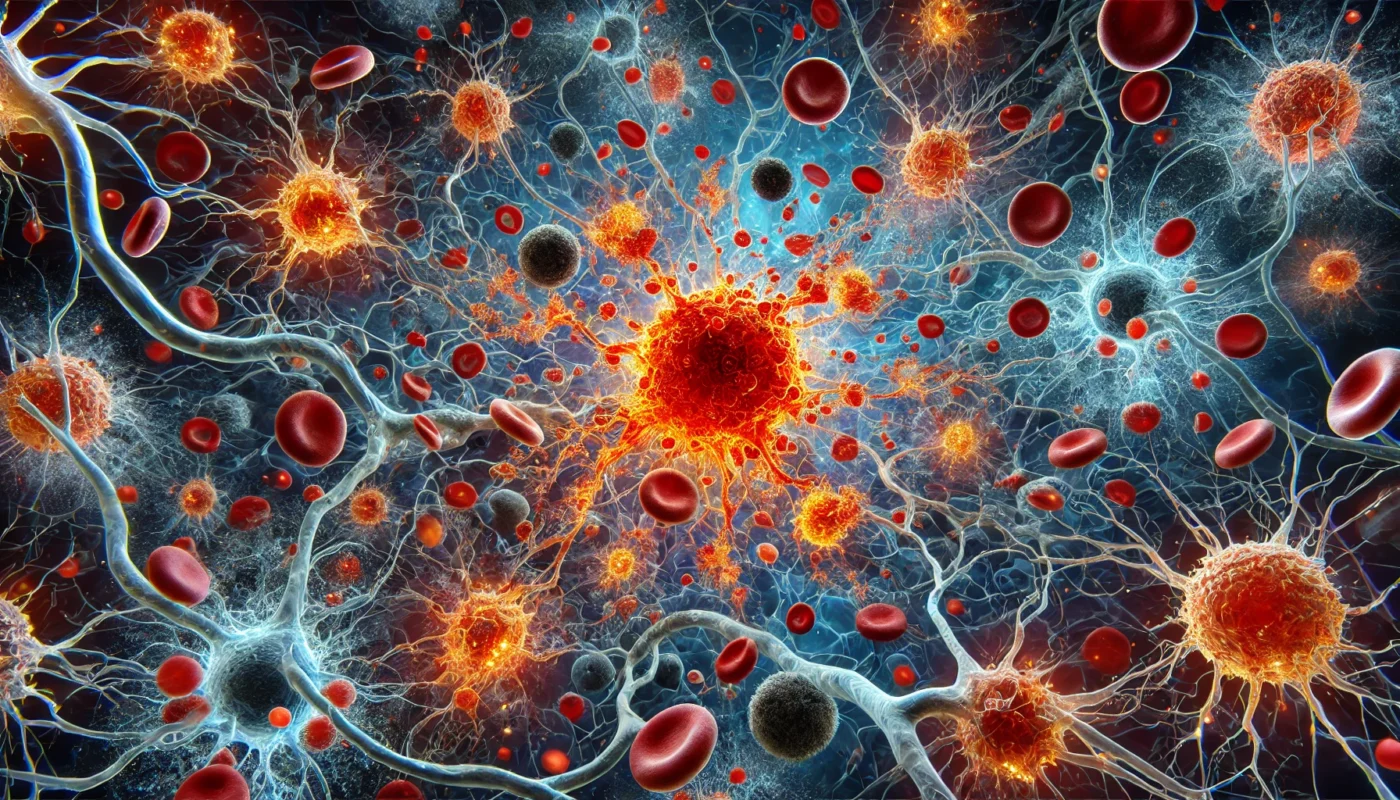Immune inflammatory diseases, often referred to as autoimmune diseases, occur when the body’s immune response turns against its own tissues, leading to inflammation. This inflammation can affect various parts of the body, including the joints, skin, and organs. Understanding the mechanism of these diseases is essential for managing and potentially mitigating their impact on health.
You may also like: 20 Powerful Anti-Inflammatory Foods
The Role of the Immune System
The immune system is a complex network of cells, tissues, and organs working in concert to defend against harmful invaders like bacteria and viruses. It is composed of the innate and adaptive immune systems, each playing a critical role in identifying and eliminating pathogens. However, in autoimmune diseases, this system mistakenly targets healthy cells, causing chronic inflammation. This misdirected response is what characterizes autoimmune disorders and leads to tissue damage and various symptoms.
The Mechanism of Autoimmunity
Autoimmunity arises when the immune system loses its ability to distinguish between self and non-self, leading to an attack on the body’s own cells. This process involves genetic predisposition, molecular mimicry, and the presence of autoantibodies that target healthy tissues. Understanding these mechanisms is crucial for developing targeted therapies that can modulate the immune response and minimize tissue damage.
Commonly Affected Body Systems
Autoimmune diseases can impact virtually every organ system, leading to diverse clinical manifestations. The most commonly affected systems include the musculoskeletal system, skin, gastrointestinal tract, and central nervous system. Each disease presents unique challenges and requires tailored management strategies to address specific symptoms and complications.
Chronic Inflammatory Diseases List
Chronic inflammatory diseases include a wide range of conditions that can significantly affect an individual’s quality of life. Here are some notable examples:
- Rheumatoid Arthritis (RA): Affects the joints, causing swelling, pain, and potential joint damage. It is characterized by the presence of rheumatoid factor and anti-citrullinated protein antibodies, which contribute to synovial inflammation.
- Lupus: A systemic disease that can impact multiple organs, including the skin, kidneys, and heart. Its hallmark feature is the production of antinuclear antibodies that attack various cell components, leading to widespread tissue damage.
- Inflammatory Bowel Disease (IBD): Comprising Crohn’s disease and ulcerative colitis, these conditions affect the digestive tract. They involve chronic inflammation of the gastrointestinal lining, resulting in abdominal pain, diarrhea, and malabsorption.
- Psoriasis: A skin condition that leads to red, scaly patches. It is driven by an overactive immune response involving T-cells and cytokines, which accelerates skin cell turnover and causes characteristic lesions.
- Multiple Sclerosis (MS): Affects the central nervous system, disrupting communication between the brain and the body. It is marked by immune-mediated damage to the myelin sheath, leading to neurological deficits.
These diseases highlight the varied manifestations of immune inflammatory responses and underline the importance of understanding their specific characteristics.
Causes and Risk Factors
While the exact cause of autoimmune diseases remains elusive, a combination of genetic, environmental, and hormonal factors is believed to contribute to their development.
Genetic Predisposition
Certain genetic markers have been associated with a higher risk of developing autoimmune diseases. These markers can be inherited, increasing the likelihood of disease occurrence within families. Studies have identified several genes involved in immune regulation that, when altered, predispose individuals to autoimmunity. Family history plays a significant role, and individuals with relatives suffering from autoimmune diseases are at a higher risk of developing similar conditions.
Environmental Triggers
Environmental factors such as infections, stress, and exposure to toxic chemicals may trigger autoimmune responses in genetically predisposed individuals. Infections can lead to molecular mimicry, where the immune system confuses self-antigens with pathogen antigens, leading to an attack on the body’s tissues. Lifestyle choices, including diet and exercise, can also influence the onset and progression of these diseases. Chronic stress and exposure to environmental toxins may exacerbate immune dysregulation, further complicating disease management.

Hormonal Influences
Autoimmune diseases are more prevalent in women, suggesting that hormonal factors, particularly those related to estrogen, may play a role in disease development. Hormonal fluctuations during pregnancy, menopause, and menstrual cycles can impact immune function and potentially trigger or worsen autoimmune conditions. The interplay between hormones and immune responses is complex, necessitating further research to unravel these intricate relationships.
Symptoms and Diagnosis
The symptoms of autoimmune diseases vary widely depending on the specific condition and the organs affected. Common symptoms include fatigue, joint pain, skin rashes, and fever. Due to the complexity and variability of these symptoms, diagnosing autoimmune diseases can be challenging.
Diagnostic Approaches
Diagnosing autoimmune diseases typically involves a combination of medical history, physical examination, laboratory tests, and imaging studies. Blood tests that detect specific autoantibodies are often used to confirm a diagnosis. Imaging techniques such as MRI and ultrasound can reveal structural changes in affected organs and tissues. Comprehensive evaluation by a multidisciplinary team is often necessary to arrive at an accurate diagnosis and to differentiate autoimmune diseases from other conditions with overlapping symptoms.
Challenges in Diagnosis
Autoimmune diseases often present with nonspecific symptoms that mimic other conditions, making diagnosis difficult. The fluctuating nature of these diseases, with periods of remission and exacerbation, adds another layer of complexity. Early diagnosis is crucial for preventing irreversible damage, but it requires a high index of suspicion and thorough investigation. Delayed diagnosis can lead to significant morbidity, underscoring the importance of awareness and timely intervention.
Importance of Early Detection
Early detection of autoimmune diseases allows for prompt initiation of treatment, which can slow disease progression and improve outcomes. Recognizing early warning signs and seeking medical attention can prevent complications and enhance the quality of life. Patient education and awareness campaigns are essential for promoting early diagnosis and encouraging individuals to seek timely medical care.
Holistic and Alternative Approaches
In addition to traditional medical treatments, many individuals seek holistic and alternative approaches to manage autoimmune diseases. These approaches focus on supporting the body’s natural healing processes and reducing inflammation.
Dietary Interventions
Adopting an anti-inflammatory diet rich in fruits, vegetables, whole grains, and healthy fats can help manage symptoms. Foods high in omega-3 fatty acids, such as fish and flaxseed, are particularly beneficial. Eliminating processed foods, sugars, and unhealthy fats can reduce inflammation and support immune health. Personalized nutrition plans that consider individual food sensitivities and preferences can optimize dietary interventions and improve adherence.
Mind-Body Practices
Stress management techniques, including yoga, meditation, and tai chi, can help reduce inflammation and improve overall wellbeing. These practices promote relaxation and may positively influence immune function. Regular practice of mind-body techniques can enhance mental health, reduce anxiety, and improve pain management. Integrating these practices into daily routines can foster a holistic approach to managing autoimmune diseases.

Herbal and Nutritional Supplements
Some supplements, such as turmeric, omega-3 fatty acids, and vitamin D, have shown promise in reducing inflammation. However, it is essential to consult with a healthcare professional before starting any supplement regimen. The efficacy and safety of supplements can vary, and professional guidance ensures appropriate dosing and monitoring. Combining supplements with conventional treatments can enhance therapeutic outcomes and provide additional support for managing symptoms.
Practical Tips for Managing Autoimmune Diseases
Here are some strategies to help manage autoimmune diseases effectively:
- Stay Informed: Understanding your condition empowers you to make informed decisions about your health. Keeping up-to-date with the latest research and treatment options can enhance disease management and provide a sense of control.
- Work with Healthcare Providers: Collaborate with your healthcare team to develop a personalized treatment plan. Open communication and regular follow-ups can ensure that treatment strategies are aligned with individual needs and preferences.
- Monitor Symptoms: Keep track of symptoms and potential triggers to better manage flare-ups. Maintaining a symptom diary can help identify patterns and inform treatment adjustments.
- Prioritize Self-Care: Engage in regular physical activity, get adequate sleep, and practice stress-reduction techniques. Self-care practices can improve resilience, enhance immune function, and promote overall wellbeing.
- Seek Support: Connect with support groups or counseling services for emotional and mental support. Sharing experiences with others facing similar challenges can foster a sense of community and provide valuable coping strategies.

Conclusion
Immune inflammatory diseases can be challenging, but with a comprehensive understanding and a proactive approach, managing them becomes more feasible. By integrating traditional medical treatments with holistic and alternative strategies, individuals can enhance their quality of life and regain a sense of control over their health.
Navigating the complexities of autoimmune diseases requires a multifaceted approach, but with the right tools and knowledge, you can embark on a journey toward improved health and wellbeing. Whether you’re a fitness enthusiast, a health enthusiast, or a medical patient, understanding these diseases is the first step towards effective management and recovery.
Further Reading:
Disorders of the Immune System
immune inflammatory diseases, autoimmune diseases, immune system, chronic inflammation, rheumatoid arthritis, lupus, inflammatory bowel disease, psoriasis, multiple sclerosis, genetic predisposition, environmental triggers, hormonal influences, symptoms, diagnosis, holistic approaches, dietary interventions, mind-body practices, herbal supplements, self-care, health management
Important Note: The information contained in this article is for general informational purposes only, and should not be construed as health or medical advice, nor is it intended to diagnose, prevent, treat, or cure any disease or health condition. Before embarking on any diet, fitness regimen, or program of nutritional supplementation, it is advisable to consult your healthcare professional in order to determine its safety and probable efficacy in terms of your individual state of health.
Regarding Nutritional Supplements Or Other Non-Prescription Health Products: If any nutritional supplements or other non-prescription health products are mentioned in the foregoing article, any claims or statements made about them have not been evaluated by the U.S. Food and Drug Administration, and such nutritional supplements or other health products are not intended to diagnose, treat, cure, or prevent any disease

